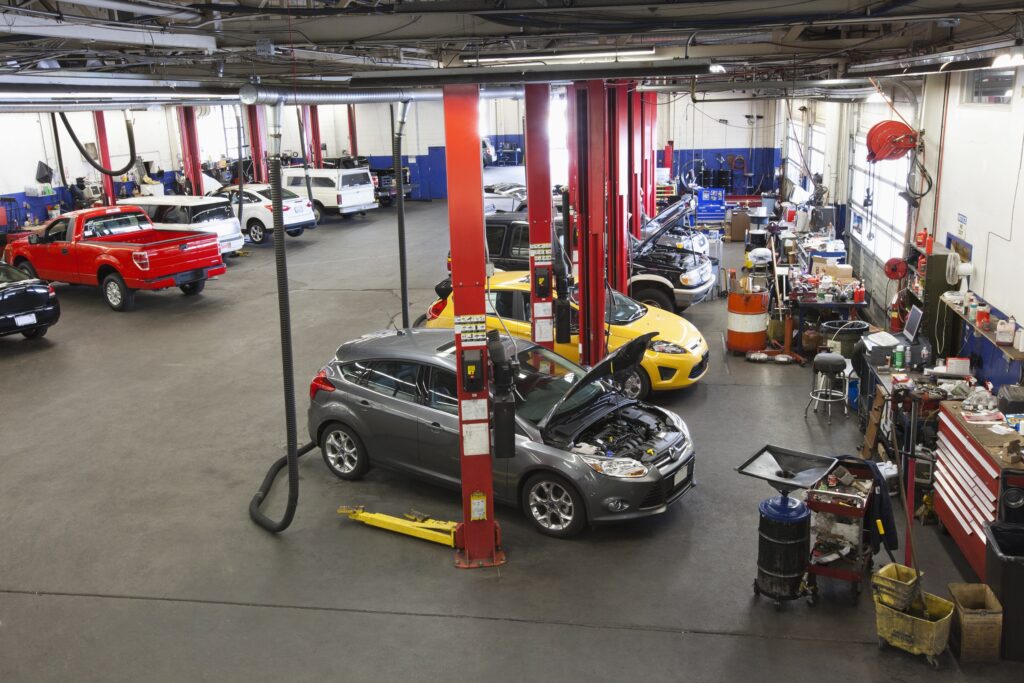Unless you happen to own or work in an auto shop, you probably haven’t given much thought to your garage floors. Generally, when people think about sprucing up or updating their garage, it has more to do with adding new shelving and organizational systems than applying a floor coating. But, the floor is just as important to the aesthetic and cleanliness of the garage as any other feature. If you care enough about keeping your garage clean to sweep or vacuum the floors once in a while, then you should also care enough to apply a garage floor coating to protect it against stains caused by oil leaks and other damage.

In this article, we’ve debunked the six most common myths about garage floor coatings, so that you can make an informed decision.
Myth #1: You Can Use Paint Instead of Epoxy
Paint may look pretty, but it’s just a cover-up and doesn’t actually protect your garage floor from damages or oil stains. Epoxy is a thick mixture of resins and hardeners that prevent stains from penetrating the surface layer and protects the flooring underneath. It’s also chemically, abrasion, and UV-resistant, which makes it more flexible and durable than paint.
Myth #2: Garage Floor Coatings Will Start to Peel Over Time
Again, this is simply not true. Industrial- and commercial-grade garage floor coatings feature strong bonding materials that allow them to cure quickly and adhere to the surface of your flooring for maximum long-term protection. Epoxy and polyurethane floor coatings contain a mixture of resins and hardeners. When these ingredients are mixed together, they quickly start to harden and form a durable membrane that adheres to concrete and other flooring materials.
Paint, on the other hand, is simply a veneer to make your flooring look good, but it can’t offer any substantial or long-term protection and will begin to chip and peel at the first signs of weight or pressure from your vehicle.
Myth #3: Garage Floors Can Be Coated after a Quick Wipe-Down
Actually, it takes a lot more than simply wiping down or sweeping away dust and debris from your garage floor to prepare it for a floor coating. Several steps are needed to properly prepare a garage floor for an epoxy or polyurethane protective coating application.
- Remove all dust, debris, loose cement, etc.
- Remove any contaminants like liquid or oil stains.
- Surface grinding is required to achieve the appropriate surface profile to aid in the adhesion process.
Carefully preparing your concrete garage floor for the coating process is extremely important. If it’s done incorrectly or insufficiently, then the epoxy or polyurethane coating won’t bond with the floor surface, which will mean you’ll have to redo the entire process.
With slab on-grade construction, which is the case with most garage floors, it is also recommended you use a moisture mitigating primer, like ISOMAT Duroprimer-SG, to ensure proper membrane adhesion. This prevents any hydrostatic pressure from coming up through the concrete slab and causing delamination of your floor coating. This primer is applied after surface prep before your epoxy or polyurethane application.
Myth #4: Garage Floor Coatings Must Be Reapplied Every 2-3 Years
This is only true of most store-bought DIY kits or improperly applied so-called professional applications. If the garage floor coating system was applied the right way from the beginning, it should last much longer. That includes standard wear and tear that’s to be expected. Professional garage floor coating applications may cost a little more than a DIY project, but they offer superior protection against oil leaks, spills, anti-freeze, wind shield wiper fluid stains, and so much more. Plus, they’re easy to clean and require minimal maintenance.
Myth #5: Professional Garage Floor Coatings Are Expensive
Yes, professional garage floor coating applications certainly come at a slightly higher price tag than a store-bought DIY kit. But that’s only because you’re paying for higher quality materials, excellent workmanship, and a product that’s guaranteed to last for many years to come. When you add up the cost of constantly having to reapply at-home kits because of their lower quality compositions and the lack of skill involved, it actually makes sense to use a professional garage floor coating solution.
Myth #6: It’s Impossible to Repair Cracks in Coated Garage Flooring
Once again, this is a misconception. Professional installers will patch larger cracks ensuring they have a solid uniform surface prior to coating. Applying garage floor coatings like epoxy or polyurethane can hide smaller imperfections in your concrete floor to the extent that no one will be able to tell the difference. Moreover, garage floor coatings also prevent future damages from occurring.
Contact IMC Distributors for Commercial Garage Floor Coating Solutions
IMC Distributors is the exclusive partner of ISOMAT S.A. epoxy and polyurethane floor coating solutions in Ontario and throughout Canada. We offer an extensive product line of high-end, flexible, and durable garage floor coating solutions that are guaranteed to last a long time and extend the lifespan of your flooring system. Contact us, or one of our distributors, today to learn more.
 Karli Logan is the Owner and President of IMC Distributors which is the exclusive partner of Nukote Coating Systems in Canada. With a B.Sc and M.Sc, as well as a demonstrated history of working across a number of industries, she has a passion to drive significant gains and benefits for IMC’s clients.
Karli Logan is the Owner and President of IMC Distributors which is the exclusive partner of Nukote Coating Systems in Canada. With a B.Sc and M.Sc, as well as a demonstrated history of working across a number of industries, she has a passion to drive significant gains and benefits for IMC’s clients.